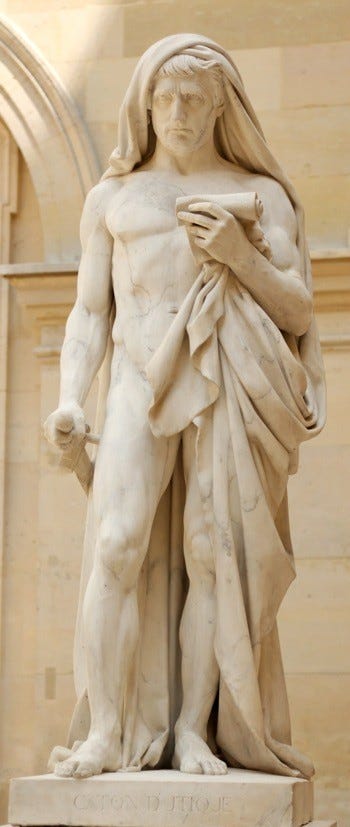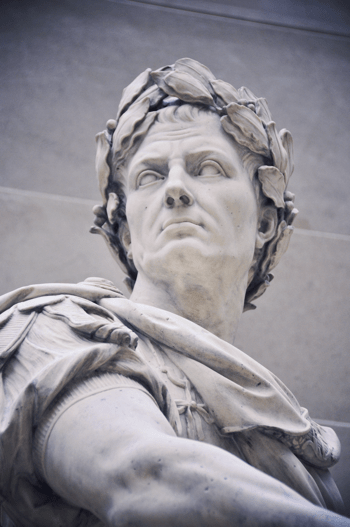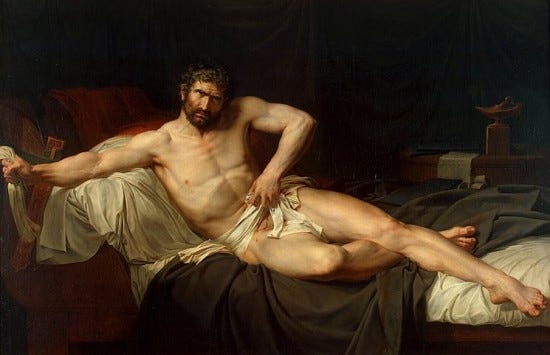
Dear Classical Wisdom Reader,
I saw that there has been a recent social media trend, asking men of all ages about how often they think about the Roman Empire.
It turns out, a lot of them think about the Roman Empire every day!
BUT... what about the Roman Republic?
A republic which was transformed into an empire is perhaps even more compelling than the empire itself.
So, today's article looks at a key figure from the dying days of the Roman Republic.
A Stoic who would prove to be a thorn in the side for Julius Caesar and, through his dramatic death, became a symbol of the Republic which was lost.
Read all about Cato the Younger just below... and you’ll find something worth thinking about!
All the best,
Sean Kelly
Managing Editor
Classical Wisdom
P.S. If you’re more interested in the Greek side of the Classical world, be sure to check out our upcoming course The Essential Greeks! Featuring video lectures, live webinars, Q&As and more, it’s a fantastic way to go deeper into the Classics.
Become a Member! Gain access to our archives of EXCLUSIVE podcasts, e-books, webinars and more on all things ancient.
The Fall of a Republic: Cato the Younger
by Van Bryan
I’ve always held the belief that ancient history, in this case the history of the final years of the Roman Republic, are of such interest to readers because the subject matter can often be downright dramatic. Betrayal, bloodshed, assassinations- these were commonplace in the days of ancient Rome. A political squabble, very literally, could often become a matter of life and death.
The tumultuous era of Roman history when the republic fell, and the empire rose, is a wonderful example of some juicy historical details. And while Caesar did usher in the beginning of the end for the Roman Republic when he crossed the Rubicon and, in his own words, “cast the die”, we should remember that the Republic did not go down without a fight.
That’s right dear reader! Today we are talking about the man who (almost) stopped Caesar. Along with none other than Cicero, he is often considered to have been one of the staunchest opponents of Julius Caesar’s and a great advocate for the Roman Republic. He is Cato the younger.
Much has been made of the struggle between Cato the younger (from here on referred to simply as “Cato”) and the soon to be dictator perpetuo. Was it a struggle between tyranny and liberty, good and evil? There are certainly some in history who think so. George Washington actually coordinated a showing of the 1713 play Cato, which dramatizes the final days of Cato, for his troops at Valley Forge as a means to inspire their vigor for liberty.
But first things first. Who was this defender of republican ideals? Who is Cato?
Much of what we know about this man comes from the Roman author Plutarch and his aptly titled Life of Cato. Plutarch tells us that as a young man, Cato was exceptionally bright, mature beyond his years and, even at a young age, steadfast and immovable in his convictions.
Plutarch tells us that as a young boy at a social event, Cato took part in a mock trial with other children. The children, playing as judge, jury, prosecution and defendant, supposedly found a good-natured boy guilty of some crime and locked him away in a chamber. The boy cried out to Cato for help and the young Cato responded by pushing the other children aside and freeing the prisoner.
It is fortunate that we so recently discussed Stoicism, dear reader, because it was said that, as a young man, Cato devoted himself to studying the Stoic philosophy and went about cultivating himself to become a great Stoic citizen. This was not unique to Cato the younger. His great-grandfather, Cato the Elder, had famously done the same thing only a few decades before.
As a result of his study of Stoicism, Cato lived in a very modest way. It was said he wore only the plainest clothing and ate only when necessary. He often subjected himself to the rain and cold in order to create a tolerance for discomfort. This adherence to the Stoic lifestyle is made all the more remarkable when we consider that Cato came from a rather wealthy family. He could have easily lived in luxury and decadence for the rest of his life if he so chose.
Perhaps because of his insistence to cultivate virtue through philosophical means, Cato gained a reputation for being exceedingly honest and for possessing an unshakeable resolve.
I know what you are probably thinking at this point. ‘Sure, that seems all well and good, but didn’t you mentioned something about Cato going toe to toe with none other than Julius Caesar?’
Indeed I did, dear reader! While we could easily spend days discussing the various stories surrounding Cato the younger, and spill untold amount of editorial ink in the process, let’s try to be a little more succinct and hit the highlights.
Shall we?
It was probably unavoidable that Cato would end up on a collision course with Caesar. After all, it was said that at the age of 14 Cato offered to kill the Roman Dictator, Lucius Cornelius Sulla, with the words…
“Give me a sword, that I might free my country from slavery.”-Cato (Plutarch’s Life of Cato)
Cato first locked horns with Caesar in 59 BC when Cato, now a member of the Roman Senate, attempted to block Caesar’s bid for consulship of Rome (the highest elected political office of the Republic).
Plutarch tells us that Caesar, returning from his military expeditions in Spain, wished to hold a triumph (a public spectacle celebrating Roman, military victories) while also running for the consulship in absentia.
The Senate was at first willing to grant such a request, but Cato vehemently opposed such a proposition. To prevent the Senate from voting on the matter, Cato filibustered on the Senate floor until nightfall. As a result, Caesar was forced to choose between a triumph and running for the consulship. He opted to abandon the triumph and ran for, and one, consulship of Rome in 59 BC.
Immediately following the election, Caesar allied himself with another influential Roman political player, Gnaeus Pompeius Magnus, known commonly as “Pompey”.
Plutarch tells us that together, Caesar and Pompey enacted laws that distributed land and grain to the poor. In doing so, Caesar was currying favor with the common people and, in the words of Plutarch, “stirring up and attaching to himself the numerous diseased and corrupted elements in the commonwealth. “
Cato regarded such legislation as politically motivated. While the poor benefited from the subsidized land and food, it was Caesar who really won out by boosting his reputation and allure among the common people. Cato viewed Caesar with a wary eye and believed him to be a mortal threat to the Republic.
For the next several years, Cato would make every attempt to block Caesar and deter his every ambition. When Caesar proposed another piece of legislation that would divide almost all of Campania, a region in southeast Italy, amongst the poor and needy, Cato again opposed this bill with his trademark stubbornness.
Plutarch tells us that Cato was so obstinate, in fact, that Caesar ordered the Roman guards to drag Cato from the Senate and place him in prison. Cato was lead from the room, speaking out against Caesar all the while.
The Roman historian, Cassius Dio, tells us that one Senator was so appalled by this use of force that he declared…
“I prefer to be with Cato in prison rather than here with you (Caesar)!”-Cassius Dio (Roman History)
Cato was by no means the only opponent of Caesar’s. However, he was undoubtedly the most vocal and most unyielding. He was, in many ways, the common thread between every opposition that stood in the way of Caesar’s aspiration for power during the 1st century BC.
Despite his efforts, Cato was unable to prevent Caesar from attaining governorship of Illyria and the Gaul, a region in Northern Italy, as well as an army of four legions at his command. In the words of Plutarch, “Cato warned the people that they themselves by their own votes were establishing a tyrant in their citadel.”
It would seem Cato’s predictions would come to pass in 49 BC when Caesar, accompanied by the 13th Roman Legion, crossed the Rubicon intent on taking power from the Senate and abolishing the Republic.
It was now that all eyes were on Cato, the man who had warned of such an attack for years.
“Caesar was reported to be marching against the city with an army, then all eyes were turned upon Cato, both those of the common people and those of Pompey as well; they realised that he alone had from the outset foreseen, and first openly foretold, the designs of Caesar. 2 Cato therefore said: ‘Nay, men, if any of you had heeded what I was ever foretelling and advising, ye would now neither be fearing a single man nor putting your hopes in a single man.’”-Plutarch (Life of Cato)
What followed was the Roman Civil War, sometimes referred to as “Caesar’s Civil War”. While Cato and the Roman Senate, bolstered by the armies of Pompey, would struggle against Caesar, the were ultimately defeated. Caesar’s victory would effectively end the Roman Republic and usher in the age of the Roman Empire.
What of Cato?
In 46 BC Cato found himself in Utica in Northern Africa. His armies defeated and his men slaughtered by Caesar, Cato had been backed into a corner. Caesar, now dictator perpetuo, offered to pardon Cato.
Cato however, refused to accept such a pardon. Doing so would be a tacit admission of Caesar’s legitimacy as a dictator, something that Cato would simply not allow. He committed suicide by impaling himself with a dagger, one final act of rebellion against the man who had ushered in the death of his beloved Republic.
Classical Wisdom is a reader-supported publication. To receive new posts and support the Classics, consider becoming a free or paid subscriber.
Más info en frasco@menadelpsicologia.com / Tfno. & WA 607725547 Centro MENADEL (Frasco Martín) Psicología Clínica y Tradicional en Mijas Pueblo #Psicologia #MenadelPsicologia #Clinica #Tradicional #MijasPueblo
*No suscribimos necesariamente las opiniones o artículos aquí compartidos. No todo es lo que parece.



No hay comentarios:
Publicar un comentario